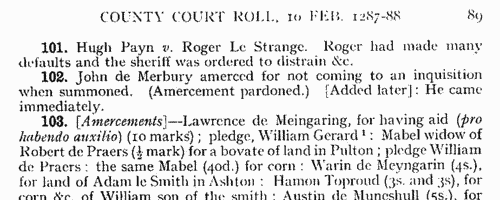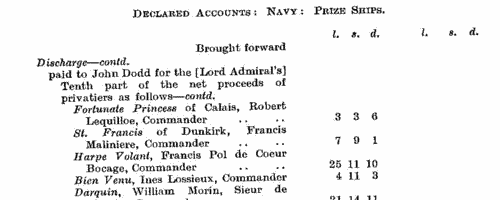Worksop Surname Ancestry ResultsOur indexes 1000-1999 include entries for the spelling 'worksop'. In the period you have requested, we have the following 7 records (displaying 1 to 7): Buy all | | | Get all 7 records to view, to save and print for £32.00 |
These sample scans are from the original record. You will get scans of the full pages or articles where the surname you searched for has been found. Your web browser may prevent the sample windows from opening; in this case please change your browser settings to allow pop-up windows from this site. Clerks and Clergy in Yorkshire, Nottinghamshire, and parts of Lancashire
(1266-1279)
The register of archbishop Walter Giffard of York, containing general diocesan business, mostly relating to clergy, was edited by William Brown for the Surtees Society and published in 1904. The ancient diocese of York covered all of Yorkshire and Nottinghamshire, as well as Lancashire north of the Ribble, southern Westmorland, and Hexhamshire in Northumberland. But there are few entries relating to the archdeaconry of Richmond, and few about the peculiar jurisdictions of Southwell, Ripon, Beverley and Hexham. The dioceses of Carlisle and Durham, both in the province of York, are hardly mentioned. Archbishop Giffard spent much of his pontificate away from his diocese, and the register has gaps: but at least it survives, unlike those for his immediate predecessors, Sewall de Boville (1256-1258) and Godfrey de Ludham (1258-1264). Moreover, there are ordination lists (pages 187 to 198) of acolytes, subdeacons, deacons and priests ordained in 1267 to 1274. These usually give full name, and indicate whether the man was 'religious' (a monk or friar), and whether his 'title' (sponsorship) arose from his own patrimony, but 'title' is not usually otherwise specified. WORKSOP. Cost: £4.00.  | Sample scan, click to enlarge

| Cheshire Court Rolls
(1259-1290)
Civil and criminal cases for most of Cheshire were handled by the county courts. Here we have the county court rolls for November 1259 to August 1260, December 1281 to September 1282, and December 1286 to September 1289. The city of Chester exercised its own jurisdiction, and here we have crown pleas and presentments from 1287 to 1297. The royal manor of Macclesfield in the east of the county had three independent jurisdictions - the hundred, forest and borough. Royal justices in eyre dealt with civil and criminal cases from the hundred and forest during their yearly visits, and here we have records from 1284 to 1290. Also covered by this index is an Inquest of Service in Time of War in Wales of 1288, listing knight's fees in the county. WORKSOP. Cost: £4.00.  | Sample scan, click to enlarge

| Close Rolls
(1429-1435)
The close rolls of the 8th to 13th years of the reign of king Henry VI record the main artery of government administration in England, the orders sent out day by day to individual officers, especially sheriffs of shires: they are an exceptionally rich source for so early a period. There is also some material relating to Wales, Scotland, Ireland and the English possessions in France. Also included is the Exchange Roll of 1424 to 1434, of licences to transmit sums of money out of the realm.WORKSOP. Cost: £4.00.  | Sample scan, click to enlarge

| Inhabitants of Leicester
(1327-1509)
The Corporation of Leicester commissioned the publication (in 1901) of extracts from the borough archives of 1327 to 1509, edited by Mary Bateson. This volume brings together several important sources: a coroner's roll of 1327; the merchant gild rolls; tax returns; court rolls; rentals; mayoral accounts, &c. All the Latin and French texts are accompanied by English translations. Not all the tax rolls surviving for this period are printed: but full lists of names are given for tallages of 1336 (pp. 34-40); 1347-8 (69-71); and 1354 (93-99); subsidy rolls of 1492 (331-334) and 1497 (351-353); and a benevolence roll of 1505 (370-374). There is a calendar of conveyances (388-446), and a list of mayors, bailiffs, and other officials (447-462); and, finally, entrants into the merchant gild
from 1465 to 1510. Membership of the merchant gild was by right of inheritance (s. p. = sede patris, in his father's seat), or by payment of a fee called a 'bull' (taurus). Those marked * paid their bull, and were thus, by implication, not natives, or at least not belonging to gild merchant families. By 1400 membership of the gild merchant had become the equivalent of gaining freedom of the borough (being a free burgess): but thitherto the two were not necessarily the same, and some of the merchant gild members were not resident in the borough, merely traded there.WORKSOP. Cost: £4.00.  | Sample scan, click to enlarge

| Treasury and Customs Officials, Civil Servants, Military Officers and Pensioners
(1706-1707)
Government accounts, with details of income and expenditure in Britain, America and the colonies, October 1706 to December 1707: an abstract prepared by William A. Shaw, and issued in 1952 by authority of the Lords Commissioners of the Treasury, but not hitherto indexed. These are the main Revenue and Expenditure Accounts, together with the audited Declared Accounts for each main department: Guards and Garrisons; the Army in the Low Countries; the Army in Spain and Portugal; purchase of horses for remounting the Forces sent to Portugal, and subsidy paid to the King of Portugal; Marines; Transport; Remittances to Flanders; Chelsea Hospital; Navy Treasurer; Commission for Sick and Wounded Seamen and Exchange of Prisoners-of-War; Prize Ships; Admiralty Droits; Salvage Money; Ordnance; Cofferer of the Household; Treasurer of the Chamber; Her Majesty's Works and Buildings; Queen Anne's Private Pensions; Treasury Solicitor; the Tin Affair in Cornwall and Devon; Customs; Tobacco; Silks and Linens; Excise; Salt Duty; Malt Duty; the Mint; Wine Licences; General Letter Office and Penny Post Office; Stamped Vellum, Parchment and Paper; Hackney Coach Licences; Hawkers and Pedlars; Hanaper; First Fruits and Tenths.
WORKSOP. Cost: £6.00.  | Sample scan, click to enlarge

| Nottinghamshire Marriage Licences
(1701-1753)
Nottingham Archdeaconry, which was almost coextensive with the county of Nottingham, lay in the diocese and province of York, but it had substantially independent jurisdiction for both probate and the issuing of marriage licences. These are abstracts of the archdeaconry marriage licences: they usually state the groom's address, occupation, age, and condition; the bride's address, age and condition; and the names of the churches or parishes at which it was intended the marriage would be celebrated. Not all licences led to marriages. Where the age given is 21, it should be construed as '21 or over'. There was no obligation for the marriage to take place at the parish suggested, but the licence would only be valid within the county. These abstracts have been annotated with extra information found on the marriage bonds. 26 Nottinghamshire parishes (Beckingham, Darlton, Dunham, Eaton, North Leverton, Ragnall, Rampton, South Wheatley, Cropwell Bishop, Bleasby, Blidworth, Calverton, Caunton, Edingley, Farnsfield, Halloughton, Holme, Kirklington, Morton, North Muskham, Norwell, Oxton, South Muskham, Southwell, Upton and Woodborough) lay within the small peculiar jurisdiction of Southwell, which issued its own licences: abstracts of these for the period 1755 to 1833 are also included here.WORKSOP. Cost: £4.00.  | Sample scan, click to enlarge

| English and Welsh bankrupts and their solicitors
(1822)
The Monthly Magazine or British Register included a section each month of Bankruptcies extracted from the London Gazette, followed by a list of dividends. These are the bankrupts (and their solicitors) listed in the 53rd volume, 1 February to 1 July 1822.WORKSOP. Cost: £6.00.  | Sample scan, click to enlarge

|
Research your ancestry, family history, genealogy and one-name study by direct access to original records and archives indexed by surname.
|









